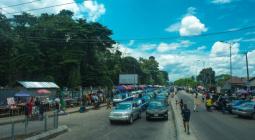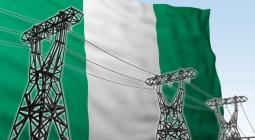The village that stood up to big oil – and won
On 10 October 2004, Eric Dooh received an urgent call from one of his father’s employees: the waterway surrounding their houses was running black with oil. Near the outskirts of Dooh’s village of Goi, a pipeline built by Royal Dutch Shell in the 1960s carried oil from inland Nigeria to an offshore terminal where it would be barreled and exported around the world. Dooh suspected the pipeline had sprung a leak. He attempted to alert the pipeline operator, but both Shell and its Nigerian subsidiary had largely abandoned oil operations in Goi a decade earlier in response to local uprisings. On that day, Shell’s community relations officer was unavailable, Dooh recalled. He reported the leak to a nearby police station instead.
It wasn’t until the next day that officials climbed onboard a helicopter, ascended over Dooh’s village situated on the banks of the Oroberekiri Creek in Nigeria’s southern Niger Delta region, and confirmed what villagers already knew: oil was spreading and not letting up.
Later that day, the situation in Goi went from bad to worse. Oil spilled into a local farmer’s house and connected with a cooking fire. The village, its oil-seeped creek and the surrounding mangrove forests erupted into flames.
On 12 October a team of investigators – made up of locals, government officials, and employees for Shell’s Nigerian offshoot, Shell Petroleum Development Company – located the source of the leak: an 18-inch hole in an exposed portion of the pipeline. They temporarily plugged the split pipeline with wood chips and later sealed it with a clamp, but over the course of the three-day leak, the operators never shut off the flow of oil at its source. By then, more than 23,000 litres of oil had spilled and nearly 40 acres of mangrove forest had burned, poisoning the land and fishponds that were the lifeblood of the village.
Shell would later argue in court that locals brought the disaster upon themselves; the leak was the work of saboteurs, they claimed. Vandalism and theft are common in the region, but so too is old and abandoned pipeline infrastructure that’s prone to leaks. Dooh and his father, Barizaa, who was the chief of their village, attested the oil spill was the result of a poorly maintained pipeline.
Two years dragged by before government agencies began clean-up efforts around Goi. “We were eating, drinking, breathing the oil,” Dooh said. By 2010, six years after the initial leak, Goi was still too polluted to sustain its residents. The Nigerian government ordered them to abandon their homes and permanently evacuate Goi. By then, most of the villagers, including the Dooh family, had already moved away, scattered across nearby towns.
Today, the oil industry in Nigeria faces a reckoning with Shell at the helm. According to Amnesty International, the oil company has come under “unprecedented legal scrutiny” in recent years for its negligent and criminal practices in the Niger Delta. Several lawsuits are ongoing while others have culminated in courts ordering Shell to pay plaintiffs billions of dollars in damages. The mounting pressure has Shell considering a rapid departure from the region’s oil market. In early August 2021, the company announced it would sell off all remaining onshore oilfields in Nigeria, citing challenges with community unrest, sabotage and a company-wide refocus on promoting green energy. But locals and lawyers see the move as Shell ducking its responsibility to clean up after itself. A court in March barred Shell from selling any more assets in Nigeria while the company appeals against a ruling in which it was found liable for a 2019 oil spill and ordered to pay affected communities nearly $2bn in damages.
“It is incomprehensible to imagine that if these spills and this level of pollution occurred in North America or Europe that it would be allowed to happen,” said Mark Dummett, the director of Amnesty International’s global issues programme.
Dooh and his neighbors were among the hundreds of thousands of Niger Delta residents who had suffered from spills in the half century after Shell discovered oil in the region. Dooh and his father set out to put an end to the industry’s legacy of environmental pollution, corporate greed and human rights abuses. But seeking justice and compensation for their losses was not for the faint of heart. For one, they would be going up against a multibillion-dollar, multinational conglomerate with a team of experienced lawyers at their disposal. Then there was fear of arrest and reprisal. Government security forces provided security for oil companies and often responded violently to protests and uprisings against oil pollution. In 1995, the Nigerian government hanged nine environmental activists, who became known as the Ogoni Nine, named for the Indigenous Ogoni people, who spoke out against Shell’s pollution.
Accountability was hard to come by. But Dooh and his family had lost everything: their village, their thriving chicken farm and bakery, their fishponds and livelihoods. They wanted Shell to pay.
In June 2005, less than a year after the leak in Goi, residents of another village about 90 miles west called Oruma reported seeing oil “bubble out of the ground”. Over the course of 11 days, an estimated 63,600 litres of oil had spilled from a nearby Shell pipeline. Then in August 2007, in the village of Ikot Ada Udo, about 100,000 litres of oil leaked from an above-ground wellhead that was built by Shell in 1959 but never used for oil extraction, according to court records.
To barrister Chima Williams, an environmental and human rights lawyer in Benin City, the string of oil spills were not one-off accidents spread out over a few years, but the result of a larger pattern that he was intimately familiar with. As the executive director of the non-governmental organization Friends of the Earth Nigeria, Williams wanted to make a statement that would reverberate across the oil industry. He embarked on a search for the most polluted communities in the region, visiting more than 20 villages that had been devastated by recent oil spills.
Williams came across Eric and Barizaa Dooh, as well as three other farmers and fishermen from Oruma and Ikot Ada Udo. Their lives had been upended by a cycle of oil spills and inaction; Williams knew he had a strong legal argument to build four separate cases against the oil company. And so on 9 May2008, lawyers hired by Friends of the Earth Nigeria and its Dutch sister company, Milieudefensie, sued Royal Dutch Shell and SPDC in the Netherlands.
It was a David versus Goliath battle: a group of Nigerian farmers and fishermen and a human rights NGO taking on one of the largest oil conglomerates in the world. The lawsuits were unprecedented; never before had a European court ruled over a corporate liability case in which the plaintiffs were foreigners and the incidents in question had happened overseas. But justice would not be swift; the court cases – fraught with complexity, appeals, obstruction and delaying tactics – would inch along for more than 13 years.
By 2009, Eric Dooh had taken over as lead plaintiff in their case after his father became ill. When he traveled to The Hague to testify in court, an event that drew global attention, Dooh said he felt like a celebrity. Before delivering his testimony, he became gripped with fear. “I have never experienced that before,” Dooh recalled. “I had not even traveled by air, let alone talk[ed] in the midst of white, white, white, people who will be questioning you.”
Shell, for its part, would not give in easily. The company employed well-honed stalling tactics. For the first few years of legal proceedings, Shell lawyers argued that a Dutch court had no legal standing to hear a case about incidents that happened in a foreign country. Then they said Shell was not responsible for the 2004 leak in Goi in the first place because they believed it was caused by local saboteurs. Investigators found soil had been dug up around the pipeline, possibly before the leak. The team of government officials and Shell representatives called to the scene noted in their initial report that oil leaked from a straight slice of the pipeline, indicating, they said, it had been sawed.
- It is incomprehensible to imagine that if these spills and this level of pollution occurred in North America or Europe that it would be allowed to happen
- Mark Dummett, the director of Amnesty International’s global issues programme
Shell’s legal team rejected allegations that the 40-year-old pipeline had not been properly maintained, but they refused to hand over evidence proving so, claiming it had been lost. Once they eventually did hand over the maintenance records, the documents were so heavily redacted they were illegible, according to Channa Samkalden, a lawyer representing Friends of the Earth and the plaintiffs. The delaying tactics continued. The courts ordered Shell to assemble a team of experts to travel to Goi and investigate the cause and impact of the oil spill. For two years, Shell delayed this process, citing security concerns in the Niger Delta, Williams said.
The strategy to draw out the court proceedings did far more than test the plaintiffs’ patience and resolve. By the time the group of fishermen and farmers heard the court’s verdict, three of the four original plaintiffs in the case, including Dooh’s father, Barizaa, had died of either sickness or old age.
On Friday 29 January 2021, Dooh, Williams and a handful of environmental activists and journalists gathered in the event hall at the Visa Karena hotel in Port Harcourt, Nigeria. They connected by videofeed to a courtroom 4,000 miles away in The Hague, Netherlands, where three judges in black robes and white jabots prepared to deliver their long-awaited decisions.
Just before the judges read the verdicts, the internet connection in Port Harcourt cut out and the videofeed went blank. Dooh waited in silence until Samkalden, sitting in the Netherlands, called them to share the news.
In the case of Dooh v Shell, the Dutch Court found the Nigerian subsidiary SPDC liable for damages caused by the October 2004 oil spill. Shell’s Dutch headquarters, however, were not held at fault. The court also ruled that SPDC acted unlawfully by not discontinuing the oil supply to the pipeline. The oil company was ordered to compensate Dooh for damages incurred from the spill and the fire, while also finding it liable in two other cases Williams and his team had brought.
Environmental and human rights activists hailed the verdicts as historic, landmark rulings that would help pave the way for victims of oil pollution around the world to seek justice and compensation from companies who have acted criminally for decades.
The dominos have since started falling against Shell. In February, the UK supreme court agreed to hear the cases of two other Niger Delta communities, Ogale and Bille, who are suing Royal Dutch Shell and SPDC for widespread environmental pollution. In August, more than 10 years after a Nigerian supreme court first ruled it must do so, Shell finally agreed to pay the Ejama-Ebubu people approximately $111m in compensation for oil spills that occurred in the 1970s.
“A global standard has been set that the oil companies will not only be held responsible for the destruction they cause to any of their host communities but will also be reprimanded and held to take steps not to further destroy the environment and source of livelihoods of citizens,” Williams said to the press immediately after the court judgment was announced.
Dooh, today in his 50s, still visits Goi, now only skeletal remains of the once bustling village where he grew up. He can point out where the mangrove forest stood before it burned down in the 2004 fires, where his father kept his chicken flock, where an old shrine to crocodile deities once stood. At his fishponds, oil sheens still fray from the water’s edge, dead fish float at the surface. In the village’s one-room school, hip-tall weeds have cracked through the concrete floor. Moss, mold and mildew spread up the walls. Small plots of farmland have succumbed to the encroaching bush. At the village entrance, a rusted signpost reads, “Public Notice, PROHIBITION! Contaminated Area, Please Keep Off.”
At the edge of the village, Dooh, wearing his signature green togokpéé, a chieftaincy dress, and his father’s red cap, recalls that his grandfather was a celebrated palm wine tapper but that because of the oil pollution, there are hardly any raffia palm trees left to tap. The crocodiles too are all gone.
“It is like a museum for now,” Dooh says of the village. Standing in a back room of his father’s now dilapidated bakery, he laughs at the determination of a tree that has grown through the ceiling. When he receives his compensation from Shell, he plans to rebuild the bakery, establish a vocational school and provide jobs to his community.
“I will reinvent this place,” he says. Dooh hopes to rebuild his father’s legacy and pass on his prosperity to his daughter, Queen, who is studying accounting in school.
While the string of successful lawsuits has ushered in a wave of hope among Niger Delta residents, it remains unclear if real justice and change will be delivered. Seventeen years after the Goi oil spill and more than a year after The Hague ruled in Dooh’s case, the legal teams continue to negotiate a compensation package for the plaintiffs. (Shell confirmed that negotiations are ongoing but declined to comment further on this case or their activities in Nigeria.)
“It feels very inappropriate to claim a victory like that, knowing that we left our clients without any relief until this very day,” said Samkalden, the attorney helping represent Dooh. “The real difference needs to be that relief for victims of environmental abuses, human rights abuses abroad, can be obtained within, if not weeks or months, at least within a couple of years, but not like here: 15 years or so. It is kind of ridiculous.”
Meanwhile, Dooh and other community leaders lament the passage of a new law that various experts say aims to attract domestic and foreign oil industry actors and make the Nigerian oil market less risky.
“That is another round of battle,” Dooh said. “It is the global community that is advocating for green energy. Now you are inviting the world to this environment again for bigger industry for oil production. Is this part of the world the dumping ground? Are we not human beings?” Dooh asked.
by Jess Craig in Port Harcourt. | Guardian





